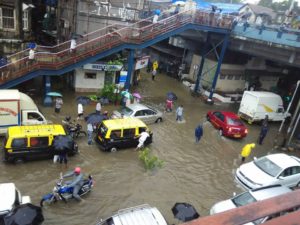Climate Resilient Infrastructure Planning for Greater Mumbai
Urban infrastructure plays a critical role in sustaining the resources required for managing a city. It provides critical social and economic services beyond its boundaries. While the location and urban service has to be upgraded with rise in population and change in demographics, the design and development has to with stand climate change impacts during its operational lifetime. The project conceptualized by eckonirmitee intends to develop and demonstrate urban infrastructure model to support climate resilience planning for city of Mumbai. It addresses specific strategies to address climate change for sustainable delivery of urban services relating to solid waste management and storm water management to Greater Mumbai.
Greater Mumbai is a city that is more than a financial capital for India with a population of 12.5 million and floating population of 5 million every day. Mumbai to indian economy generates 25% industrial output, 70% capital transactions and contributes 5% to GDP of India1. Mumbai Metropolitan area suffers from urban flooding due to heavy rains pouring from July to October months and more then that it suffers due to inability of infrastructure to mitigate and adapt itself to this challenge. The Fact Finding Committee on Mumbai Floods had attributed the disaster to destruction of mangroves with dumping of construction and other waste for reclamation and uncontrolled haphazard growth of city2. This city was brought to stand still on 26th July 2005 with urban flooding; the catastrophe was attributed to severe rains, hard landscaping, inability of street infrastructure to divert storm water to streams. This tolled death of 5000 people and financial loss amounted to 100 million USD. While city is facing pressures in terms of increased demands for resources, infrastructure and urban services it is also increasingly exposed to the brunt of climate change and variability. Above all the structural and financial risks and vulnerabilities associated to climate impacts, the most pressing ones would be the impact on the lives of the poor – the worst victims of non-inclusive urban development. Shifting the development paradigm towards climate resilience would reap benefits that would go beyond environmental concerns, fostering social and economic sustainability3.
The Global Resilience Partnership defines resilience as the ability of people, households, communities, countries, and systems to mitigate, adapt to, recover from, and thrive and learn in the face of shocks and stresses, in order to reduce chronic vulnerability and enable sustained development, inclusive growth and learning, and transformative capacity. Resilience Building is the most apprised term to us in today’s world whenever a cyclone hits a coastal region or heavy rains are poured. Even at micro level, with the shifting temperature patterns households and communities are widely anticipating and/or developing a system to adapt to those changes. This has been acknowledged in regard to urban areas which are most vulnerable and disproportionately face higher risk from effects of climate change4.
Rapid Urbanization accompanied by surge in energy needs would call for innovative approaches to tackle the existential resource constraints in a manner that would combine efficiency with cost effectiveness right from the design stage to all the other aspects of the cities functioning. There is an intrinsic relationship between urban development and the way a city manages its resources. Cities which are resource efficient integrate greater productivity with reduced environmental impact offering a more holistic model for urbanisation. As such, the transition towards sustainable cities depends on how well this integrated approach to urban planning is taken up and seen as a major opportunity for investment in the field of renewable energy, waste management and other such areas that account for the sustainability of cities. The demographic shift and migration to urban areas has brought its own set of unique challenges, which are of particular importance when seen in the context of, the prevailing socio-economic inequalities in developing countries and the resource constraints faced by an expanding world population.
This project re imagines climate change adaptability and urban flood resiliency by developing products and services out of solid waste. The solution integrates utilization of construction and demolition waste management for developing infrastructure products that mitigates climate resilient challenges. The minimum viable product from this project deals with sustainable transformation of construction waste in urban areas by recycling debris and utilizing geo polymer concrete to create pervious pavers for allowing storm water from streets to recharge ground water aquifers through storm water. This system will be designed to reduce flow energy, cleanse, convey and infiltrate water generated from nearby impervious surfaces and channelize it to storm water drains. Eckonirmitee looks forward to develop possible energy resilient systems that are required to ensure city wide sustainability in the context of Greater Mumbai. It would address some of the core infrastructural choices such as energy efficiency, waste management, and urban ecosystem management available for city at local level that can help its transition to more sustainable versions in future. The minimum viable product from this project deals with sustainable recycling of construction waste in urban areas to create pervious pavers for allowing storm water from streets to recharge ground water aquifers through storm water. This system will be designed to reduce flow energy, cleanse, convey and infiltrate water generated from nearby impervious surfaces and channelize it to storm water drains.
Reference:
- http://www.ircc.iitb.ac.in/IRCC-Webpage/mumbai.html
- Fact Finding Committee on Mumbai Floods, Volume 1, 2006
- Learnings from Climate Resilient Cities, TERI, 2014
- J Hurarera, J Cassidy, A Adriana, 2014, ‘Built-in resilience: learning from grassroots coping strategies for climate variability’, Environment and Urbanization, Vol 2 No 2, October 2010, pp. 415-431
About Author:
Rohit Sadaphal is Co Founder & Director of Eckonirmitee Infrastructure & Services that deals with sustainable recycling and environment infrastructure development. His venture specializes in construction & demolition waste recycling, organic waste recycling, landfill gas recycling & smart infrastructure. He has completed his Master’s (M.Tech) in Sustainable Urban Development and Management from TERI University, New Delhi. He holds a Bachelor’s Degree in Civil Engineering from Government College of Engineering, Aurangabad (MS). Rohit has worked previously with construction industry as Senior Planning Engineer before venturing out as an entrepreneur. He has been actively involved in doing research on the problems faced by society and developing viable socio-economic models and technology solutions. He was awarded Jury’s Grand Choice at Accenture Innovation Jockeys Season 2 powered by Yahoo for his innovation on concrete recycling.



